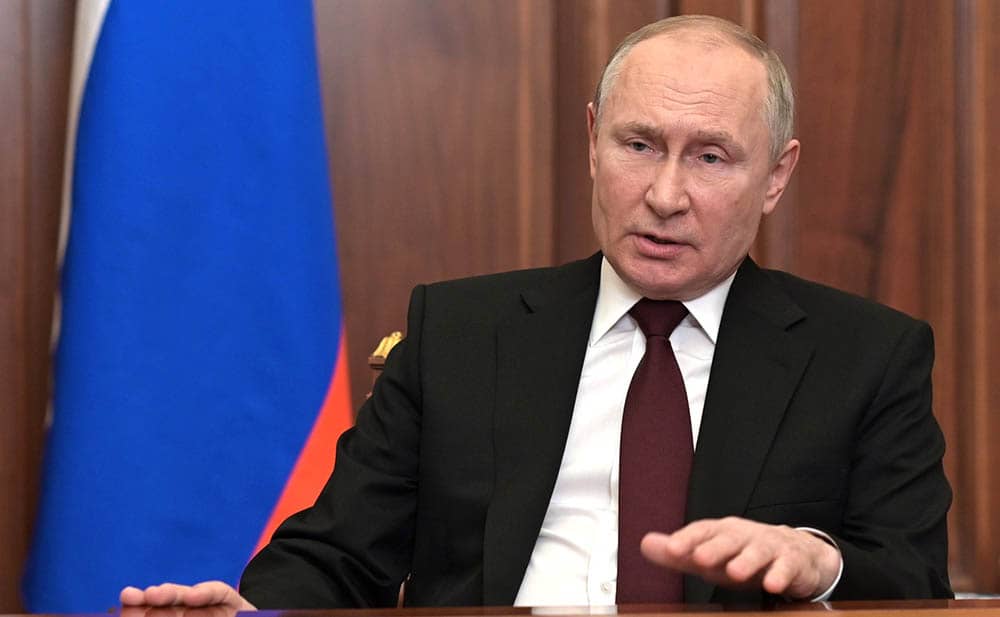Pound-Dollar Eyes 1.26, Eyes on Munich Conference
- Written by: Gary Howes

Above: File image of Russian President Putin. Image: Kremlin.ru.
Pound Sterling looks set to record a strong weekly advance against the Dollar, helped by the tailwind of hopes for an end to the war in Ukraine.
Any end to fighting would lower the geopolitical risk premium in European currencies while penalising safe havens such as the Dollar.
Analysts say the Dollar will stay on the back foot through Friday as world leaders descend on Munich to discuss security and a Ukraine peace process. Further USD weakness would allow the Pound-to-Dollar exchange rate to extend gains to the cusp of 1.26, taking the weekly advance to more than 1.0%.
GBP to USD Transfer Savings Calculator
How much are you sending from pounds to dollars?
Your potential USD savings on this GBP transfer:
$1,702
By using specialist providers vs high street banks
"The British Pound strengthened against the U.S. Dollar, benefiting from the broader weakness of the dollar. Hopes of peace talks in Europe could weigh on the USD and favour other currencies," says Ruben Ferreira, an analyst at FlowCommunity.
U.S. Vice President JD Vance will meet Ukrainian President Volodymyr Zelensky at the Munich Security Conference today, where further headlines concerning progress towards a deal are expected.
"There are clear risks to USD from any potential movement towards a ceasefire. We would flag three potential channels for this to play out: (i) lower energy prices, coupled with (ii) lower yields, leading to (iii) improved macro sentiment towards Europe," says Dominic Bunning, Head of G10 FX Strategy at Nomura.
Above: GBPUSD at weekly intervals.
Trump said he hopes to have a first meeting with Russian President Vladimir Putin in Saudi Arabia in the "not too distant future."
While initial signs of progress can weigh on the Dollar, the road to peace in Ukraine will be difficult, with many geopolitical analysts expressing concern that the U.S. and Russia are effectively sidelining Europe and Ukraine.
Asmara Jamaleh, an economist at Intesa Sanpaolo, says uncertainty surrounding the timeline and modalities of the process can limit upside potential against the Dollar, barring sudden favourable developments.
"While any effort for peace can only be a good thing, there's been alarm among European nations and in Ukraine especially, as Trump appears to have set the ball rolling in a phone call with Putin without discussing it with Ukraine’s President Zelenskiy first," notes Raffi Boyadjian, Lead Market Analyst at XM.com.
🎯 GBP/USD year-ahead forecast: Consensus targets from our survey of over 30 investment bank projections. Request your copy.
Defence Secretary Pete Hegseth said that Ukraine’s desire for NATO membership to protect against further Russian aggression is unrealistic while telling NATO allies that the U.S. would not contribute troops to any future peacekeeping force.
Trump and Hegseth said they would be happy for Russia to keep the land it conquered.
Ben Wallace, the former UK defence secretary who played a significant and leading role in the West's initial efforts to support Ukraine, said the bit that worried him the most "was this sort of reaching across to President Putin, the lack of support for Zelensky in his press conference yesterday."
He noted Trump wouldn’t even say if he viewed Zelensky as an equal and indeed didn’t really feel that Zelensky was going to be a major player in these negotiations; "it is going to be President Putin and the United States."
However, ahead of his meeting with Zelensky in Munich, Vice President JD Vance said "I think there is a deal that is going to come out of this that’s going to shock a lot of people... the president is not going in this with blinders on... He’s going to say, ‘Everything is on the table, let’s make a deal.'"
"We think the dollar can stay soft as the focus switches to the security conference in Munich and what it means for any ceasefire in Ukraine. Speculation is building that representatives from the U.S., Russia, Ukraine and perhaps Europe, too, could meet in Saudi Arabia at some stage," says Chris Turner, Global Head of Markets at ING.





